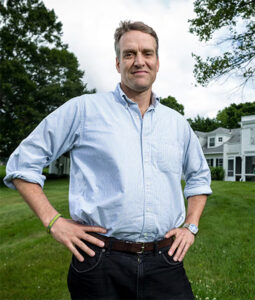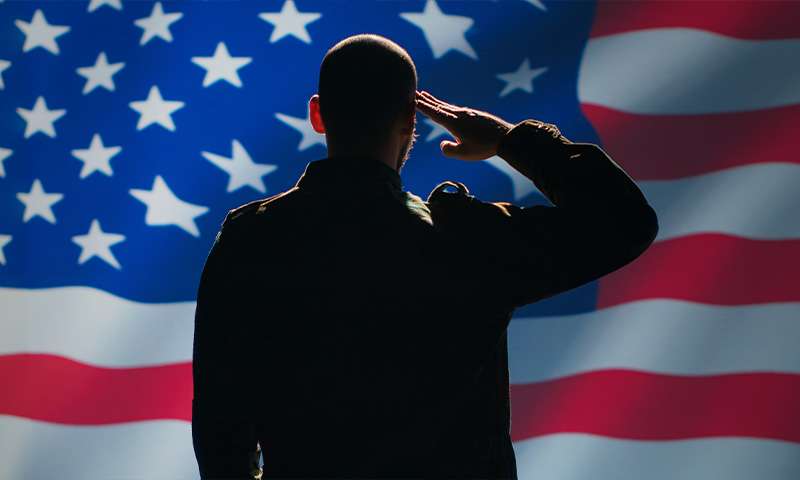The Power of Presence MORE INHERITED WISDOM ON LEADERSHIP by Ben Patton
General George S. Patton (US Army)
“Know your men” and “top-down loyalty” were my late father Major General George S. Patton’s most heralded traits. But before I move on to some others I grew up learning, I’d like to lend embellishment to my previous thoughts.
While my father never wanted to rank them, I do tend to place top-down loyalty on a different level from the others, perhaps because it is so rare these days—certainly in the civilian world in which I live and work. With that in mind, I want to share a few more examples of leadership that I observed my dad practicing.
THE CHOW LINE
When I was about 10, and my dad commanded the 2nd Armored Division (Hell on Wheels) in Texas—which his father had commanded just prior to WWII—several times a week he would show up unannounced at one of the division’s many mess halls (now DFACs) to have breakfast with the soldiers. From time to time he would roust me, pre-dawn, to tag along. After he took me a few times, I began to understand why he did this.
First, when the division CO showed up in the chow line wearing his fatigues—in my dad’s case, emblazoned with his trademark white stars, which are normally black, but he insisted that he wanted to be seen both by his troops and the enemy, to show the enemy that he had “a certain disdain for their accuracy of fire”—the cooks and staff perked up quickly. And because he showed up unannounced at a different mess hall almost every day, the food was better prepared, the kitchens and dining areas were much neater. The tables were cleared, and garbage cans had been emptied. His aide would typically join to make notes when things were not up to snuff.
More importantly, though, my dad made it a point to always sit with the enlisted men—not the officers. It was herein that one could witness my father’s top-down loyalty so beautifully demonstrated. He wanted his men to know that he was one of them, and that he cared about the common soldier, not just his commanders.
HOUSE CALLS
My latent understanding of loyalty, “know your men,” and a sense of duty stemmed from another incredible thing he used to do in all of his commands. At Fort Hood, Texas, every couple of weeks my dad would visit apartments off base in nearby Killeen, where many enlisted families lived. He would always take my mom and his Chief of Staff with him. While my mom chatted with the spouses and their kids, my dad would query the soldier on how things were going, if the apartment was in good shape, and whether the building superintendent was doing a good job.
I remember his division Chief of Staff, Colonel Maupin, telling me about one of these unannounced excursions. He recalled visiting the apartment of a young private with a wife and two small children. The soldier told him that one of the burners on his stove had not been working for several months and that the building super had never gotten around to fixing it. Well, that changed the next day.
After these trips, Maupin would give my dad a list of the names and numbers of the building supers, and the General would call them up and threaten to move the soldiers out of the building if he didn’t fix it that day. The sheer surprise of the unannounced call resulted in these things being repaired in a big hurry. My dad made it a point to always sit with the enlisted men—not the officers. It was herein that one could witness his top-down loyalty so beautifully demonstrated. He wanted his men to know that he was one of them, and that he cared about the common soldier, not just his commanders.
HOT MEALS DELIVERED
When my father was tank company commander near the end of the 1953 Korean War (aka “The Forgotten War”), he took command of four squadrons with a total of 20 main battle tanks. This was monsoon season and everything was soaking wet, covered in mud. And this sorry status—despite minimal combat—was reflected in the poor attitudes of the soldiers under his command.
He recalled that when many of the common soldiers passed my father, they would look the other way, as if they didn’t see him, and then fail to return his salute—something he immediately saw as subversive. Nonetheless, rather than taking corrective action, he thought it best not to react at all, and instead to heed a brilliant maxim the extraordinary British Naval Officer, Horatio Nelson (circa 1800), had taught his officers: “The watch captain should not change the sails until at least 30 minutes into his watch.”
My father heeded this advice and mostly observed his troops for the first couple of weeks without giving any new orders. When he inquired about the last time the company had eaten a hot meal, the mess sergeant responded that it had been more than six months. My dad immediately told him, “We are going to serve a hot breakfast and coffee to each tank crew tomorrow. It’s going to be piping hot, and you and I are going to serve it.” They started at 6 a.m. and finished at 3 p.m.—in the driving rain.
Seeing the commander do this personally had an immediate impact. My father told me, “I just lucked into that but, afterward, I had them eating out of my hand, and there was very little I had to do to improve their attitude and sense of duty from that point on.” ❦
 About the Author
About the Author
Back in 2005, I was running summer film camps, two weeks at a time, first at my parent’s estate and later with a fellow filmmaker in Denver. Eleven to 18 year-olds making films about the things that mattered most at that age: Their first kiss, puberty, getting picked on, figuring out who they were.
I quickly realized that the films were really about identity, about making sense of themselves in that awkward space between childhood and adulthood. I’d always been good with kids (I even spent a stretch substitute teaching), and when I began working with them, I went back to graduate school and earned a master’s degree in developmental psychology, to better understand how young people grow, and how storytelling could play a role in that process.
Then one summer, my father’s former Vietnam chopper pilot, Charlie Watkins, came to one of the screenings. Afterward he pulled me aside and said:
“You know, this might help veterans in transition. They’re struggling with identity too, figuring out who they are after the military.”
That was the spark because he was right.
Soldiers come home, often transitioning to civilian life, and are told to find their “new norm.” But what does that mean? Who are you when the uniform comes off? When the mission ends? When the structure and camaraderie often forged in battle that defined you disappears?
The way those kids had used film to work through adolescence got me thinking, why couldn’t veterans use film to work through transition?
So in 2011, I pivoted. I took what I’d learned from years of camps and stepped into a new arena.
We started running workshops on bases like Forts Carson, Hood, Drum, and Bragg…working with soldiers preparing to deploy again, or trying to reintegrate after combat. Some carried visible wounds, many carried invisible ones, all were searching for identity.
That’s how Patton Veterans Project began.
And at its heart, it’s still about the same things those kids were grappling with: Identity, direction, purpose. Film just gives people the space to say, this is my story, this is who I am, this is who I’m becoming.
